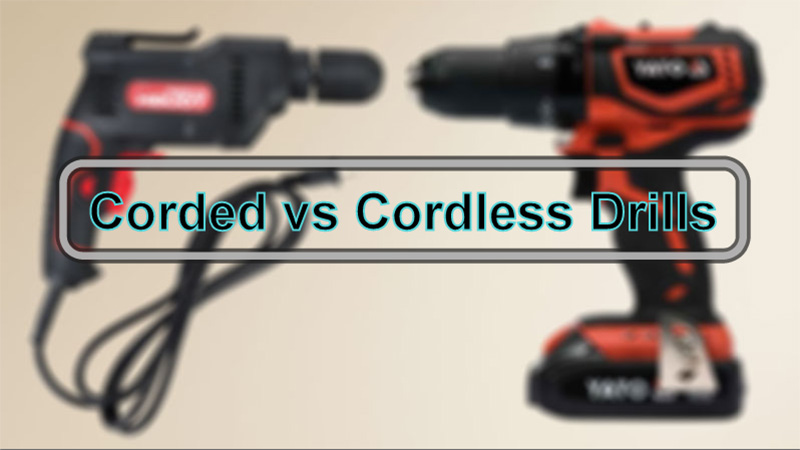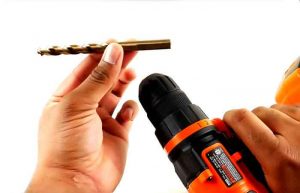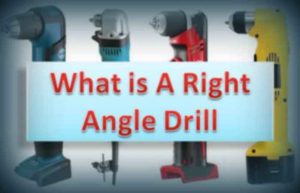Are you in the market for a new drill but are unsure whether to go with a corded or cordless model? Both have their benefits and drawbacks, but which one is right for you? In this article, we’ll take a deep dive into the corded vs cordless drill debate and help you make an informed decision. This article aims to provide a comprehensive overview of the pros and cons of both corded and cordless drills to help you choose the one that suits your needs and preferences. Whether you’re a DIYer, a professional contractor, or just starting out in the world of power tools, keep reading to find out which type of drill is right for you.
Corded vs Cordless Drill
Corded Drill
Corded drills are power tools that are powered by electricity and are designed to handle a wide range of drilling tasks. They are connected to an electrical outlet by a cord, which provides a continuous flow of power to the motor, allowing the drill to operate at a consistent and powerful speed. Corded drills are generally more powerful than cordless drills, which makes them ideal for heavy-duty tasks that require a lot of drilling power, such as drilling into thick metal or masonry.
Pros
- High power output and RPMs make them ideal for heavy-duty drilling tasks
- No need to recharge or replace batteries, providing a reliable power source
- Typically more affordable than cordless drills
- No need to worry about battery life, making them more convenient for long drilling sessions
- Consistent and powerful speed throughout the drilling process
- Long lifespan, with minimal maintenance required
- Great for use in workshops and indoor environments
Cons
- Require access to a power outlet, limiting their portability and use in outdoor environments
- Can be heavy and cumbersome to use, making them less comfortable for extended periods
- Range of motion is limited by the length of the power cord
- Can be more difficult to control due to weight and cord management
- Cord can get tangled or caught on surrounding objects
- Noise level can be louder than cordless drills, making ear protection necessary
When A Corded Drill Might Be The Best Choice
- When you need a high-powered drill to tackle heavy-duty drilling tasks, such as drilling through thick metal or masonry
- When you need to use the drill for long periods, such as in a workshop, and don’t want to worry about running out of battery power
- When you are working on a project in an indoor environment with access to a power outlet, and don’t need to move around too much
- When you need to drill at a consistent and powerful speed for a prolonged period of time
- When you are working on a project that requires high precision and accuracy, as corded drills typically have less wobbling and more control than cordless drills
- When you have a limited budget and are looking for an affordable and reliable option
- When you already have a collection of corded tools and want to add a compatible drill to your toolset.
Cordless Drill
Cordless drills are power tools that operate on rechargeable batteries instead of a power cord. They are designed to provide flexibility and portability, making them a popular choice for DIY enthusiasts and professionals who need to move around frequently while working. Cordless drills come in a variety of sizes and styles, from small, lightweight models for basic tasks to more powerful models that can handle heavy-duty drilling and driving tasks.
Pros
- Greater flexibility and portability, as they do not require access to a power outlet
- Ideal for smaller drilling tasks or projects that require a lot of movement
- Lighter and easier to maneuver than corded drills
- Quieter operation than corded drills
- No power cord to manage, providing greater range of motion and ease of use
- Lithium-ion batteries are long-lasting and lightweight, providing several hours of continuous use on a single charge
- Many cordless drills are compatible with a variety of battery-powered tools from the same manufacturer, making it easier to build a collection of compatible tools
Cons
- Less powerful than corded drills, making them unsuitable for heavy-duty drilling tasks
- May require additional batteries for extended use, increasing the overall cost
- Batteries need to be recharged regularly, which can be a concern for larger or more time-consuming projects
- More expensive than corded drills due to the cost of the battery and charger
- Battery life decreases over time, and the batteries may eventually need to be replaced
- May not be ideal for use in cold temperatures, as the battery life may be shortened
When A Cordless Drill Might Be The Best Choice
- Here are some examples of when a cordless drill might be the best choice:
- When you need to move around frequently and need the flexibility and portability that a cordless drill provides
- When you are working on smaller drilling tasks that don’t require a lot of power, such as hanging pictures or assembling furniture
- When you need to work in tight spaces where a corded drill would be difficult to use
- When you want a quieter and more lightweight option than a corded drill
- When you are working in outdoor environments where access to a power outlet may not be possible
- When you want to add to your existing collection of battery-powered tools from the same manufacturer, allowing you to use the same batteries and chargers across your tools
- When you want the convenience of not having to manage a power cord or worry about tripping hazards.
Differences Between: Corded vs Cordless Drill Table
| Corded Drill | Cordless Drill | |
|---|---|---|
| Power Source | Electricity from a power outlet | Rechargeable battery |
| Power Output | High, suitable for heavy-duty tasks | Lower, suitable for smaller tasks |
| RPMs | Higher, allowing for faster drilling | Lower, which may result in slower drilling |
| Portability | Limited by the length of the power cord | Greater flexibility and range of motion, ideal for projects that require movement |
| Battery Life | N/A | Typically several hours on a single charge |
| Weight | Heavier due to the motor and power cord | Lighter, making it easier to use for extended periods |
| Cost | Typically less expensive than cordless drills | Typically more expensive than corded drills due to the cost of the battery and charger |
| Maintenance | Minimal, with no need to replace batteries | Batteries may need to be replaced or recharged regularly |
| Best for | Heavy-duty drilling tasks or use in indoor environments | Smaller drilling tasks or projects that require portability and flexibility |
Factors to Consider When Choosing Between Corded and Cordless Drills
When choosing between a corded and cordless drill, there are several factors that you should consider to ensure that you select the best option for your needs. Here are some key factors to keep in mind:
Power Needs
Consider the types of projects you will be working on and the amount of drilling power you will need. If you will be tackling heavy-duty drilling tasks, a corded drill with higher RPMs and power output may be the better option.
Portability
Consider whether you need a drill that can be used in different locations or whether you will be working in a fixed location. Cordless drills provide greater flexibility and range of motion, while corded drills may be limited by the length of the power cord.
Battery Life
If you choose a cordless drill, consider the battery life and the amount of time you will need to use the drill on a single charge. If you will be using the drill for extended periods, a corded drill may be a better option.
Weight And Size
Consider the weight and size of the drill, as well as your own physical ability to handle it comfortably. Cordless drills are typically lighter and easier to maneuver, but may not provide the same power as corded drills.
Cost
Consider the overall cost of the drill, including the initial purchase price and any ongoing maintenance costs. Corded drills are typically less expensive than cordless drills, but may have higher energy costs.
Noise Level
Consider the noise level of the drill, as some corded drills may be louder than cordless drills. If you will be using the drill for long periods of time, noise level can be a factor.
Compatibility With Other Tools
If you already have a collection of power tools from a certain manufacturer, consider whether a corded or cordless drill from the same manufacturer would be compatible with your existing tools.
By considering these factors, you can make an informed decision and choose the best type of drill for your specific needs.
FAQs
Q: What are the advantages of a corded drill over a cordless drill?
A: The advantages of a corded drill over a cordless drill include higher power output, greater consistency of power and speed, and no need to worry about battery life or recharging.
Q: What are the advantages of a cordless drill over a corded drill?
A: The advantages of a cordless drill over a corded drill include greater flexibility and portability, lighter weight, and no need to worry about a power cord or access to a power outlet.
Q: Which type of drill is more powerful, corded or cordless?
A: Corded drills are generally more powerful than cordless drills, although some high-end cordless models can provide comparable power.
Q: Are cordless drills more expensive than corded drills?
A: Cordless drills are typically more expensive than corded drills, due to the cost of the battery and charger.
Q: Can cordless drills handle heavy-duty jobs like corded drills can?
A: Cordless drills are generally less powerful than corded drills, but high-end cordless models can handle heavy-duty jobs.
Q: How long does the battery last on a cordless drill?
A: The battery life on a cordless drill varies depending on the model and the type of task being performed, but can last several hours on a single charge.
Q: How long does it take to charge a cordless drill battery?
A: The charging time for a cordless drill battery varies depending on the model and the charger, but typically takes a few hours.
Q: Can cordless drills be used with different battery voltages?
A: Cordless drills are designed to be used with specific battery voltages, and using a battery with the wrong voltage can damage the drill.
Q: Can corded drills be used with an extension cord?
A: Yes, corded drills can be used with an extension cord, but the length of the cord may affect the drill’s power output and speed.
Q: Which type of drill is better for DIY projects?
A: The type of drill that is better for DIY projects depends on the specific needs of the project. Cordless drills are more portable and lightweight, making them ideal for smaller tasks or projects that require movement, while corded drills are more powerful and consistent, making them better for heavy-duty tasks or use in indoor environments.
Final Words
choosing between a corded and cordless drill comes down to your specific needs and the type of project you will be working on. While corded drills offer higher power output and consistency, cordless drills offer greater flexibility and portability. By considering factors such as battery life, weight and size, cost, and compatibility with other tools, you can make an informed decision and select the best type of drill for your specific needs. Whether you are a DIY enthusiast or a professional, taking the time to choose the right drill can make all the difference in the success of your project.




